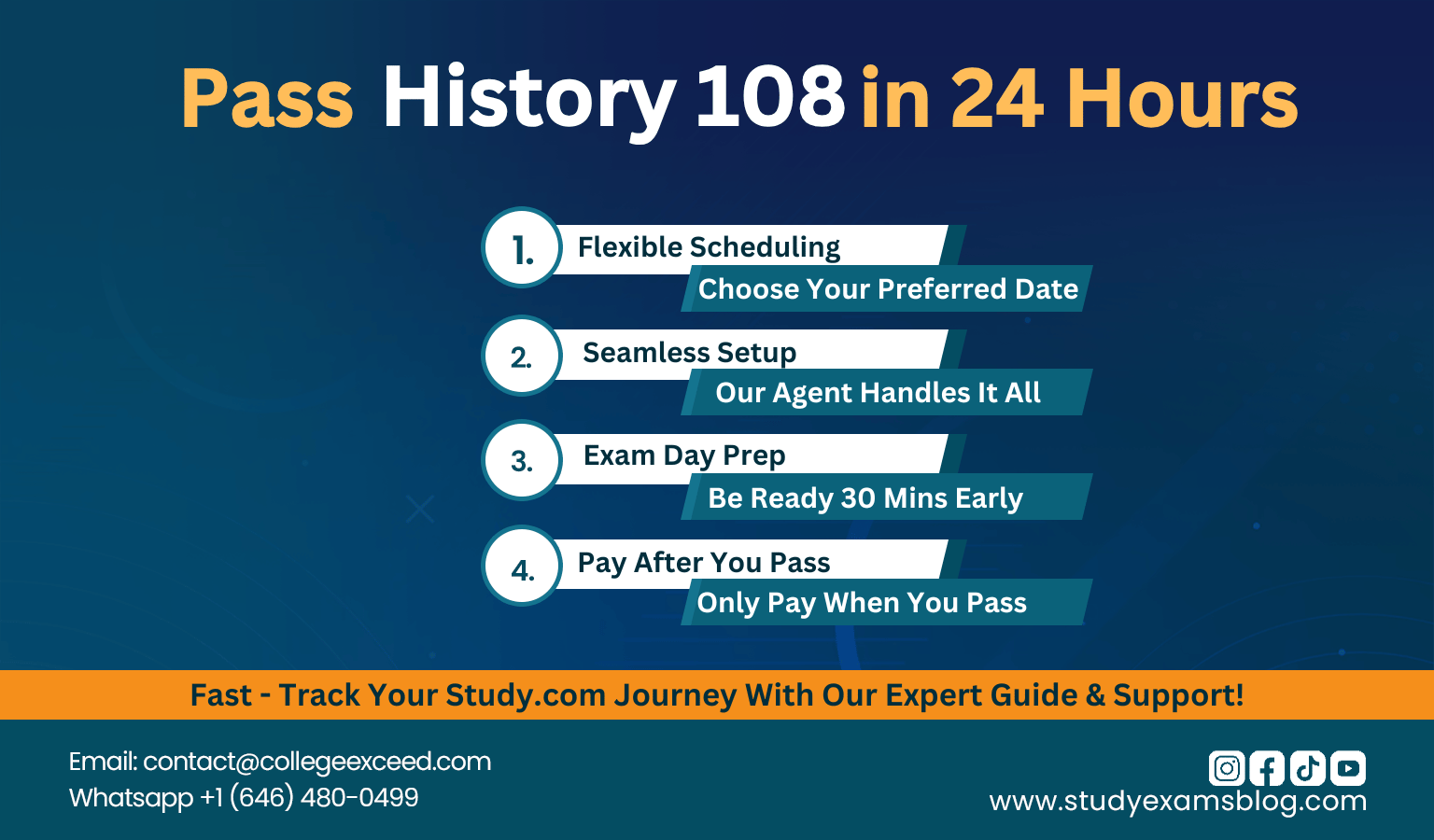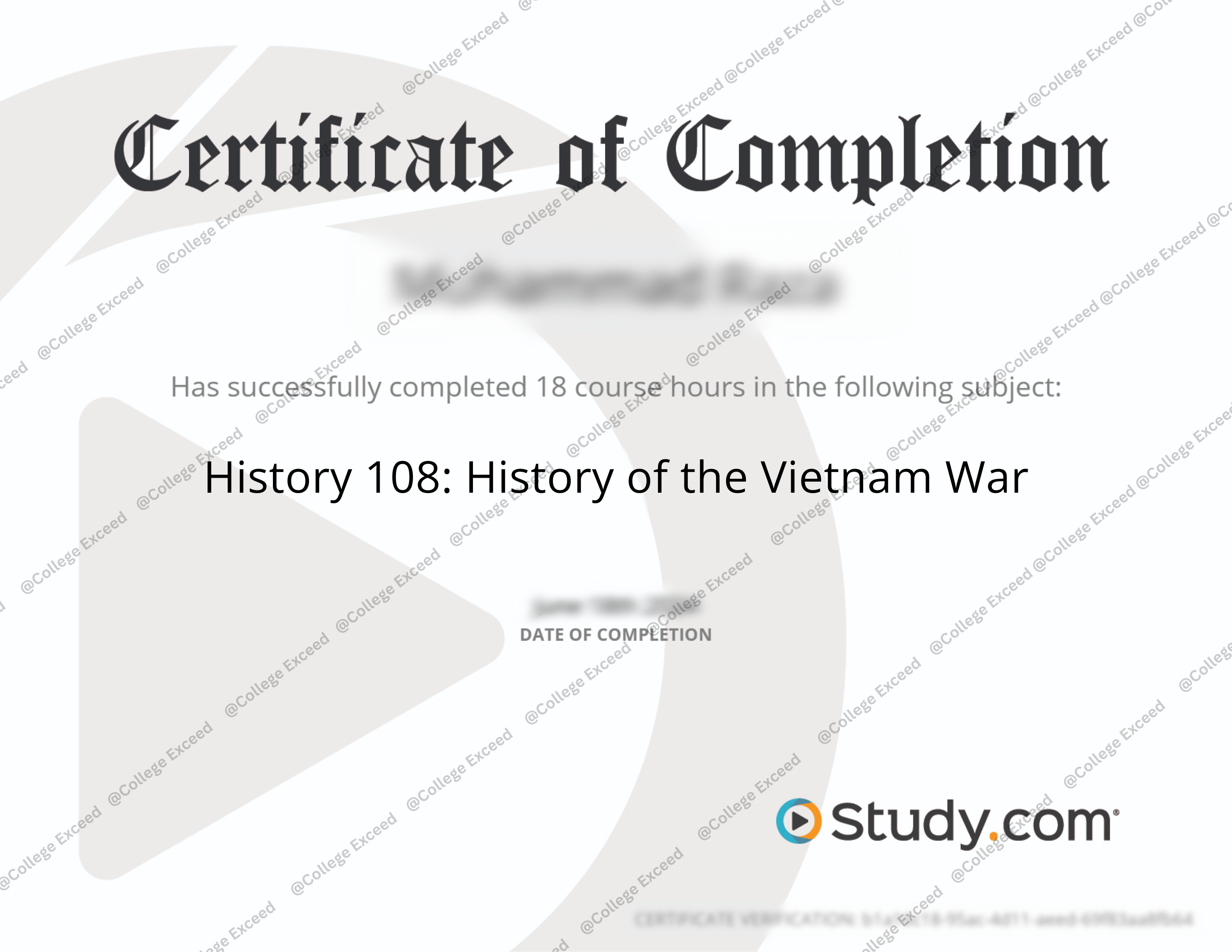
-
Gavin Walton
- October 22, 2024
If you have ever looked at one of the most ambiguous and influential wars in modern history and were fascinated with them, Study.com History 108: History of the Vietnam War deep dives into the most important one of them all. Learn about the Vietnam War – its causes, main participants, and key moments in this class that focus on the impact of the war on world affairs and the U. S. foreign policy. From the emergence of Ho Chi Minh to the liberation of South Vietnam this general course in the history of the Vietnam War offers a broad but systematic survey of political, social, and military events.
Do not be scared if you are not that much of a history learner; this course organizes each concept in a way that is easy to understand. It is specially designed for students who want to receive real college credits while being introduced to a significant historical period of the twentieth century. Plus, with Study. At com, the lessons are structured in a self-paced manner, so you can go through materials whenever you get them not only at 2 a.m. with a cup of coffee but during lunch breaks as well. It saved time when one can organize his/her calendar to the need, and I loved the idea of being prepared enough to conquer that final proctored exam!
---

What to Expect from Study.com History 108 Class 📖
In study.com 108- History of the Vietnam War, you learn about the cause and the result of a war that shaped the whole world. This course takes the learner through the roots of conflict in French Indochina, through to the end of the war and the Fall of Saigon. There are also basic informative figures observed along the way such as Ho Chi Minh, Ngo Dinh Diem, Lyndon B. Johnson, and Richard Nixon inter alia.
This class is not about filling in dates and battles that occurred throughout the war; it’s about comprehending why the war was waged and how it impacted international politics and the future of U. S. foreign policies. You will explore more of the reasons regarding the intervention of the U. S — the Domino Theory as well as the containment polices. Most of these concepts are covered in the final exam especially those relating to the conceptual tools so ensure that you gain an understanding of them as early as possible.
You must prepare for key events in history such as the Gulf of Tonkin Incident and the Tet Offensive, the Paris Peace Accords, and so on. These events will not only help you to learn more about the Vietnam War in general but will also be the main points of your final check. This is because knowing the types of causes and effects involved, as well as the players involved in each of these events, will go a long way in ensuring that you fetch good grades. Moreover, it also overviews the Vietnam Syndrome and the ways in which the USA coped with its first serious military defeat are interesting and take place in the real world, thus providing a real-world context for the lessons.
Week-by-Week Study Plan to Ace Study.com History 108 Exam📝
The best approach to crack study.com History 108: History of the Vietnam War is consistent study and review. Here’s a week-by-week plan to keep you on track and ensure you’re prepared for that final proctored exam:
Week 1: Get Familiar with the Course Structure
- To enroll in the course, watch the introductory lessons and learn the goals of the course.
- Take the first quiz on The Roots of the Vietnam War to assess your understanding.
- External resource: This quick overview of the Vietnam War (YouTube) can help provide a visual context before diving deeper.
Week 2: Focus on the Roots of the Vietnam War
- Go through the general introduction to the content which includes French Indochina, Ho Chi Minh, and the First Indochina War.
- Pay attention to the rise of nationalism in Vietnam, as this will be tested heavily.
- External resource: Quizlet is an online application that will assist in the revision of some facts about this major figure by using Flashcards on Ho Chi Minh’s Biography.
Week 3: Eisenhower and U.S. Involvement
- Refresh your knowledge with the lessons that focused on Eisenhower’s foreign policies, the Domino Theory, and the emergence of Ngo Dinh Diem. Just to make positive that you appreciate the change of strategy, moving from the French to the American control.
- External resource: Eisenhower’s Domino Theory Explained (YouTube) simplifies this key concept.
Week 4: Kennedy and Early U.S. Escalation
- Focus on President Kennedy’s advisors and their role in shaping early U.S. strategies in Vietnam. Lessons on the Buddhist Crisis and Kennedy’s assassination will also be important.
- Take quizzes to reinforce your learning.
- Sufficient information on Kennedy’s involvement is presented here in JFK and Vietnam (History.com).
Week 5: Johnson and the Escalation of U.S. Troop Involvement
- Learn about the Gulf of Tonkin Incident, Operation Rolling Thunder, and Johnson’s Military Strategies. These will be vital areas in the exam you will be asked to produce your writing.
- Make sure to take your time with lessons on the air war and Vietnamization policies.
- External resource: The Gulf of Tonkin Incident Documentary (YouTube) gives a detailed account of this pivotal moment.
Week 6: Nixon’s Vietnamization & Withdrawal
- Examine Nixon’s policies on the policy of Vietnamization and the secret bombing of Cambodia and Laos.
- Recall why the Paris Peace Accords were signed, and what this entailed in terms of the end of America’s engagement.
- External resource: Nixon and the Vietnam War (Quizlet) offers flashcards to help with memorization.
Week 7: Review Major Battles and Offensives
- Focus on key battles like the Tet Offensive, the My Lai Massacre, and the Easter Offensive.
- Understand their political and military significance.
- External resource: Major Battles of the Vietnam War (YouTube) gives a rundown of the most critical conflicts.
Week 8: Final Review & Mock Exam
- Go over any remaining quizzes or lessons you struggled with.
- Take a mock exam to simulate the proctored final.
- External resource: Quizlet Vietnam War Flashcards will help reinforce key concepts.
This study plan will help you in preparing for the final exam and once done, you will stand a better chance of passing the test.
---
Recommended Free Resources for Vietnam War Studies📂
While Study.com is well suited to give a good starting point for the Vietnam War, my study group found occasionally, a little boost from additional sources is always advantageous. Here are some more external links that can help you understand the more challenging concepts in Study.com History 108: The Vietnam War.
YouTube Channels/Playlists
- CrashCourse: The Cold War – The Vietnam War is part of the larger Cold War context. CrashCourse’s Cold War series gives a fast, fun overview of the political landscape that led to Vietnam.
- Simple History – The Vietnam War – This playlist uses simple animations and short videos to explain major events like the Tet Offensive and the My Lai Massacre.
Quizlet Flashcards
- Vietnam War Key Terms – Great for reinforcing important names, dates, and events.
- Vietnam War Timeline Flashcards – Perfect for mastering the chronology of major events and battles in the war.
Historical Documentaries
- PBS Documentary: The Vietnam War – Another product of Ken Burns that has received lots of acclaim this TV series explores all aspects of the Vietnam War. Some of them are analyzed in detail in full episodes which are very useful as supplementary material.
- The Fog of War – A documentary on the Vietnam War viewed from the perspective of the former Secretary of Defense Robert McNamara. It is also a good way to observe strategies in the U. S. from the viewpoint of the inside.
Interactive Timelines
- History Channel Vietnam War Timeline – For a detailed, interactive timeline that helps you understand the progression of the conflict.
- This is a resource by BBC that has maps, timelines, and brief descriptions of the major events and plans of the war.
These are all free resources and present different views or approaches to looking at the material. They’re useful if, for instance, you get held up on a particular topic, or wish to view the information from a different perspective!
---
Key Military and Political Events to Focus On in Vietnam War History🔑
When studying for Study.com History 108: History of the Vietnam War, there are a few key concepts that will be crucial to your understanding and performance on the final exam. Let’s break down these important topics with easy-to-understand comparisons and real-world examples.
- Containment vs. Domino Theory
Containment | Domino Theory |
|---|---|
A strategy to prevent the spread of communism by keep it within its current borders. | A belief that if one country fell to communism, neighboring countries would also fall, like a row of dominoes. |
Focused on blocking Soviet influence in Europe and Asia. | Used as justification for U.S. involvement in Vietnam to prevent Southeast Asia from turning communist. |
Example: The U.S. provided aid to Greece and Turkey to prevent Soviet influence. | Example: The fear that after Vietnam, countries like Laos, Cambodia, and Thailand would turn communist. |
- The Gulf of Tonkin Incident: Reality vs. Perception
The Gulf of Tonkin Incident is one of the critical factors that contributed to the escalation of the U.S.’s participation in Vietnam. To make such judgments it would be important to distinguish the physical events that occurred from the perspectives that were held in the American government and public sphere.
- Reality: The U.S.S. Maddox was engaged in the first episode with North Vietnamese boats on 2nd August 1964. Later the reports of the second attack were made, however, it was more baseless and can be considered as an overstatement.
- Perception: The Johnson administration employed this event to secure further escalation of the U.S. military in Vietnam resulting in the passage of the Gulf of Tonkin resolution. This granted the president naked authority over military conduct in Vietnam.
- The Tet Offensive: Military Loss vs. Political Win
Military Loss | Political Win |
|---|---|
North Vietnam failed to hold the major cities it attacked. | The scale and surprise of the attack shocked the American public, leading to increased anti-war sentiment. |
U.S. and South Vietnamese forces quickly recaptured cities like Saigon and Hue. | The media’s portrayal of the war as unwinnable increased pressure on the U.S. government to seek a way out of Vietnam. |
Example: The NLF suffered heavy losses, making it harder for them to fight in subsequent years. | Example: After the Tet Offensive, President Johnson announced he would not seek re-election, signaling the political impact of the war. |
- Vietnamization: Success or Failure?
Success | Failure |
|---|---|
The idea was to gradually withdraw U.S. troops and hand control to South Vietnamese forces. | In practice, South Vietnamese forces were not fully prepared to defend themselves without U.S. support. |
Helped reduce U.S. casualties and brought the war closer to an end for Americans. | Despite the plan, South Vietnam eventually fell to North Vietnam in 1975. |
Example: The U.S. began withdrawing troops in 1969 under Nixon’s administration. | Example: The fall of Saigon in 1975 marked the failure of Vietnamization. |
These are the main concepts that are going to be discussed in the course, in the lessons, in quizzes, and in the final exam. This is one course that requires that one have a grasp of all the military strategies, the politics involved, and the publicity aspect of all that is involved.
---
Study.com History 108 FAQ ❓
- What is the number of lessons in this course?
For this course, there are eight chapters, with several lessons under each of them. The course is meant to be straightforward where you can watch video lessons that are no more than 10-15 minutes focused on certain events or policies of the Vietnam War and the major characters involved.
- How should the students prepare for the final examination that is proctored?
The final examination is also a proctored exam and comprehensive which implies that you will be expected to draw information from all the chapters. Use the week-by-week study plan listed at the beginning of the guide, complete quizzes after each lesson, and remember to consult the additional materials for reinforcement.
- Is it possible for me to sit for the final exam more than once?
Yes! Those unsatisfied with their score can sit for the exam again for an interval of 3 days to their desired score. Be careful – make sure to use those extra attempts purposefully; better pull up something about it before re-taking it again.
- Are there several key sections to look at when preparing for the exam?
You’ll definitely want to focus on:
- Accordingly, the Domino Theory and its effects on the U. S. intervention Strategies.
- Some of the well-documented battles were the Tet Offensive and the Battle of Ap Bac.
- Some of the policies include Vietnamization while some of the events include the Gulf of Tonkin incident. It also tests your knowledge concerning these topics hence the need to ensure that you have mastery of them.
- If a particular topic proves difficult to study or understand what should I do?
If you find any topic difficult, use the external resources that we’ve provided, such as the Quizlet flashcards or YouTube channels in which the material is described in more detail if needed. One also can watch the lesson videos and make notes on the segments that are challenging in the course.
---
Final Reflections on Grasping the Complexities of the Vietnam War 📄
Study.com History 108: History of the Vietnam War provides the opportunity to study one of the most significant and controversial wars in modern history. Starting from the historical background of the Vietnam War to the policies of the US presidents and the key engagements that characterized the war, this particular course shall assist you in visualizing round perspectives concerning the warfare. Following the study plan, using other sources, the main concepts as the Domino Theory and the Tet Offensive will help to achieve success during the final proctored examination.
However, it should be noted that one should be very persistent and diligent in studying the material. Divide the learned material by week, and check your knowledge through quizzes. If you have any questions regarding the topic or want to expand your knowledge, use other sources. With some commitment and effective study strategies you not only get well prepared to pass the exam but also get good knowledge about the Vietnam War and its effects on the history of the entire world.



